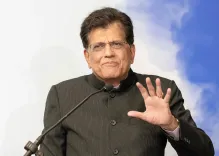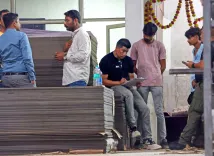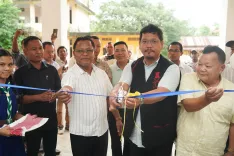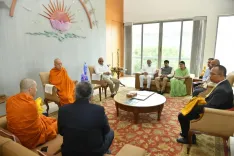How are Agricultural Scientists Engaging in Farm Fields? Shivraj Chouhan's Initiative Explained
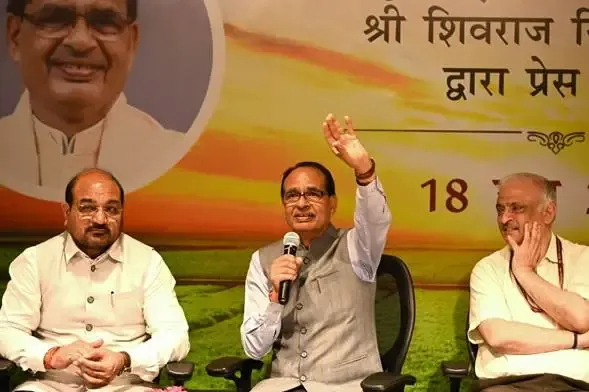
Synopsis
Key Takeaways
- Viksit Krishi Sankalp Abhiyan aims to modernize Indian agriculture.
- KVK scientists will spend three days a week in the fields.
- A state Nodal Officer will oversee agricultural challenges.
- Strong measures will be implemented for seed quality control.
- Minister Chouhan emphasizes the vision of 'One Nation – One Agriculture – One Team.'
New Delhi, June 18 (NationPress) Union Minister of Agriculture and Farmers’ Welfare Shivraj Singh Chouhan announced on Wednesday that the Viksit Krishi Sankalp Abhiyan has garnered significant success nationwide and will persist as an ongoing initiative aimed at modernizing Indian agriculture and boosting farmers' prosperity through direct field engagement.
While addressing the press, the Union Agriculture Minister unveiled a range of immediate actions to promote agricultural growth and farmer well-being.
Chouhan highlighted the essential function of Krishi Vigyan Kendras (KVKs), stating that these centers will serve as nodal agencies in each district. They will function as unified teams committed to addressing the needs of farmers. Efforts will also be made to standardize and strengthen the KVK framework throughout the country.
To ensure direct involvement with farming communities, KVK scientists will now be required to spend a minimum of three days per week in the fields. The minister also emphasized his personal commitment by stating that he would visit farms two days a week to engage with farmers directly and understand their challenges.
Furthermore, the Indian Council of Agricultural Research (ICAR) will appoint a state-specific Nodal Officer for agriculture. This officer will oversee scientific trials, identify regional challenges, provide expert guidance, and maintain close communication with state authorities. The goal is to ensure that research insights and policy responses are tailored to the specific needs of each region.
The Minister assured that he, along with senior officials, would hold regular discussions with state governments to align strategies and deliver agriculture solutions relevant to the regions.
As part of the Viksit Krishi Sankalp Abhiyan campaign, 2,170 teams comprising scientists, officials, and agricultural experts visited over 1.42 lakh villages, directly interacting with more than 1.34 crore farmers. The initiative saw active participation from Chief Ministers, Union Ministers, State Ministers, Members of Parliament, MLAs, and numerous grassroots representatives, according to the minister.
He stressed the importance of bridging existing knowledge, research, and institutional gaps to secure tangible benefits for farmers.
Chouhan raised concerns about the quality of seeds and pesticides, stating that the Ministry will take decisive steps to reinforce the Seed Act and implement rigorous quality control mechanisms, ensuring that only certified, high-quality inputs reach farmers.
“This campaign is designed to bridge the gap between research laboratories and agricultural fields. While we have witnessed remarkable progress, challenges remain. Our focus must be on increasing productivity, reducing costs, and ensuring that agriculture becomes a profitable and sustainable livelihood for every farmer,” he noted.
He commended the efforts of ICAR and the Ministry of Agriculture for the successful execution of the campaign and announced plans for its relaunch during the rabi season.
Additionally, targeted follow-up actions will be initiated with a dedicated Action Plan for Soybean. A stakeholder consultation for soybean will take place on June 26 in Indore, followed by similar initiatives for cotton, sugarcane, pulses, and oilseeds, the Minister revealed.
A national-level meeting in hybrid mode is scheduled for June 24 at the Pusa Institute, where scientists, agricultural officers, and state agriculture ministers will assess campaign outcomes. Nodal officers will present detailed reports on state agricultural conditions, laying the foundation for collaborative efforts between the Centre and states. The meeting will also explore future research priorities and structural reforms.
Chouhan indicated that under the leadership of Prime Minister Narendra Modi, food grain production has surged by 40% over the past 11 years due to consistent and strategic policy execution.
“Our mission is to ensure food security, nutritional availability, and profitable farming while maintaining soil health for future generations. India must rise as a global food hub,” he asserted.
Chouhan articulated the vision of ‘One Nation – One Agriculture – One Team’, underlining the necessity for an integrated platform where farmers, scientists, institutions, and policymakers collaborate to achieve the common objective of developed agriculture and farmer prosperity.




